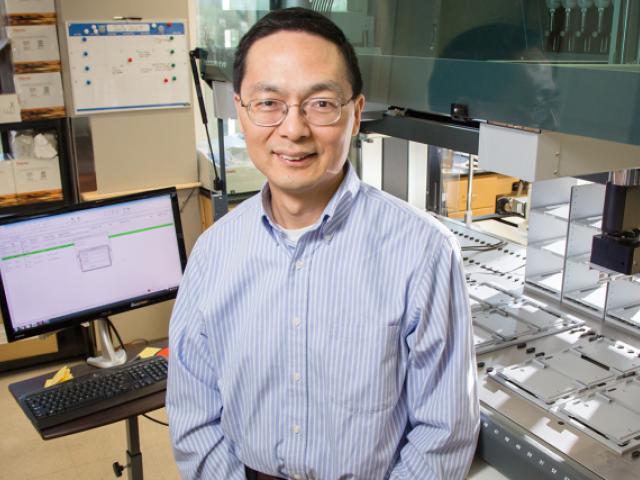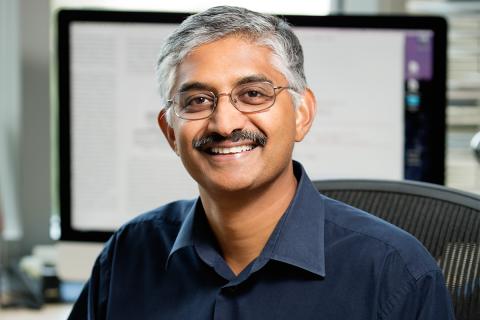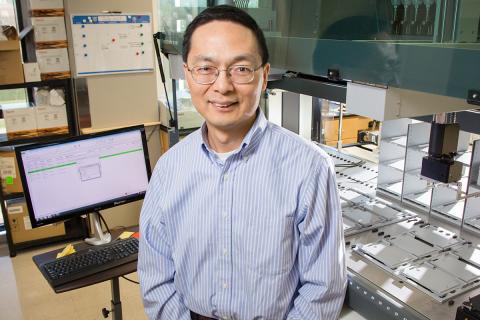Illinois to Lead Two of Seven New National AI Institutes

CHAMPAIGN, Ill. — The National Science Foundation and the U.S. Department of Agriculture’s National Institute of Food and Agriculture are announcing an investment of more than $140 million to establish seven artificial intelligence institutes in the U.S. Two of the seven will be led by teams at the University of Illinois, Urbana-Champaign. They will support the work of researchers at the U. of I. and their partners at other academic and research institutions. Each of the new institutes will receive about $20 million over five years.

Computer science professor Vikram Adve
will lead the AI Institute for Future Agricultural Resilience,
Management and Sustainability at the U. of I.
Photo by L. Brian Stauffer
The USDA-NIFA will fund the AI Institute for Future Agricultural Resilience, Management and Sustainability at the U. of I. Illinois computer science professor Vikram Adve will lead the AIFARMS Institute.
The NSF will fund the AI Institute for Molecular Discovery, Synthetic Strategy and Manufacturing, also known as the Molecule Maker Lab Institute. Huimin Zhao, a U. of I. professor of chemical and biomolecular engineering and of chemistry, will lead this institute.
AIFARMS will advance AI research in computer vision, machine learning, soft-object manipulation and intuitive human-robot interaction to solve major agricultural challenges, the NSF reports. Such challenges include sustainable intensification with limited labor, efficiency and welfare in animal agriculture, the environmental resilience of crops and the preservation of soil health. The institute will feature “a novel autonomous farm of the future, new education and outreach pathways for diversifying the workforce in agriculture and technology, and a global clearinghouse to foster collaboration in AI-driven agricultural research,” Adve said.
The Molecule Maker Lab Institute will focus on the development of new AI-enabled tools to accelerate automated chemical synthesis “to advance the discovery and manufacture of novel materials and bioactive compounds,” the NSF reports. The institute also will train a new generation of scientists with combined expertise in AI, chemistry and bioengineering. The goal of the institute is to establish “an open ecosystem of disruptive thinking, education and community engagement powered by state-of-the-art molecular design, synthesis and spectroscopic characterization technologies – all interfaced with AI and a modern cyberinfrastructure,” Zhao said.

engineering and of chemistry, will lead the new
Molecule Maker Lab Institute at Illinois.
Photo by L. Brian Stauffer
“The National Science Foundation and USDA-NIFA recognize the breadth and depth of Illinois expertise in artificial intelligence, agricultural systems and molecular innovation,” U. of I. Chancellor Robert Jones said. “It is no surprise to me that two of seven new national AI institutes will be led by our campus. I look forward to seeing the results of these new investments in improving agricultural outcomes and innovations in basic and applied research.”
Adve is a co-director of the U. of I. Center for Digital Agriculture with crop sciences bioinformatics professor Matthew Hudson. AIFARMS will be under the CDA umbrella. Zhao and Hudson are affiliates of the Carl R. Woese Institute for Genomic Biology, where Zhao leads the Biosystems Design theme. The Molecule Maker Lab Institute will be associated with two campus institutes: IGB and the Beckman Institute for Advanced Science and Technology.
For more information, see related posts, below, from associated campus units:
- NSF and NIFA Awards CDA $20M to Develop New AIFARMS Institute (Center for Digital Agriculture)
- Center for Digital Agriculture at Illinois receives $20M to develop new AIFARMS Institute (College of Agricultural, Consumer and Environmental Sciences)
- Grainger Engineering faculty lead two new AI institutes (Grainger College of Engineering)
- $20 million NSF grant, new artificial intelligence institute for molecule synthesis (Carl R. Woese Institute for Genomic Biology)
Editor’s notes:
To reach Vikram Adve, email vadve@illinois.edu.
To reach Huimin Zhao, email zhao5@illinois.edu.
Diana Yates | Life Sciences Editor, U. OF I. News Bureau
Aug 26, 2020